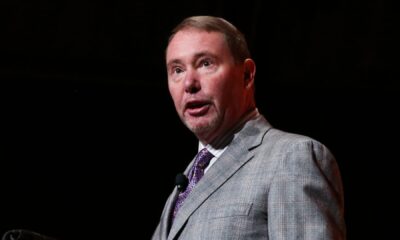Accounting
What should owners of an accounting firm call themselves?
Published
1 year agoon


Founder? Owner? President? CEO? Managing partner? You have multiple possibilities when considering which professional title to adopt as you launch your accounting firm. So, what should you think about as you decide what to call yourself as a key leader of your company?
In this article, I’ll explain what to consider when selecting a title — and describe some of the most popular titles accounting firm owners use and who they’re most appropriate for.
A professional title infers a level of authority, responsibilities and legal accountability, so it’s important to choose wisely. Various factors will influence which title is appropriate for your situation.
- Your role: Do you participate in providing services to clients or performing other tasks involved in your firm’s day-to-day operations? Or do you contribute financially and have a say in strategic decisions but do not actively work in the business?
- Your firm’s business structure: What entity type have you registered your accounting firm as? Whether you’re operating as a sole proprietorship, partnership, limited partnership, single-member LLC, multi-member LLC, corporation, professional corporation or other entity type will affect what you call yourself.
- Your firm’s size: Whether you operate a one-person business, have a large staff supporting you, or fall somewhere in between will influence what professional title makes the most sense for you.
- Your company culture: Some titles are more formal than others. While some business owners in creative fields like marketing opt to use non-traditional titles (e.g., Boss of All Things or Chief Cheerleader), a more traditional title may garner more trust in the field of accounting.
- Your state’s laws: Many states have rules specifying what accountants may call their companies and owners. Such laws help prevent firms from misleading the public.
- Accounting industry standards: Different industry organizations, such as the American Institute of CPAs, may have guidelines for their members.
Popular titles for accounting firm owners
- Managing partner: This title is often assigned to the partner in a firm who serves as the leader in charge. Using the term “partner” implies the firm is organized as some form of partnership (e.g., general partnership, limited partnership, limited liability limited partnership). Sometimes firms have more than one managing partner.
- Senior partner: The title of senior partner implies a high level of authority within a firm formed as a partnership. Senior partners typically have less control over management of the firm than managing partners.
- Partner: Using partner as a title denotes ownership of a firm that operates as a partnership, though it does not indicate the level of management control and decision-making authority the individual has.
- Managing member: In a firm operating as a
limited liability company or professional limited liability company, the title of managing member typically goes to the owner (member) with the most control and decision-making authority. Some LLCs have multiple managing members. - Founder: This title indicates the individual has been instrumental in establishing the firm and is strongly invested in shaping its vision. Often, the title is used in conjunction with another title that more fully describes the owner’s role in the business (e.g., founder and CEO).
- Owner: While this title denotes ownership in the firm, it does not give a sense of what the individual is responsible for. It’s often used with another more descriptive title (e.g., owner and president).
- Chief executive officer: This implies the individual is a top-ranking leader with significant responsibility for the firm’s success. It’s typically assigned to a high-level executive who reports to the board of directors of a corporation. “CEO” doesn’t inherently indicate the individual is an owner of the firm. Some organizations hire a CEO who does not have an ownership interest.
- President: Similar to CEO, the title of president implies the individual has a high level of authority in a firm. “President” doesn’t inherently indicate that an individual is an owner of the firm — it might be used by an owner or assigned to a high-level executive employee. Pairing the term with another, such as “president and founder,” can help bring clarity to the individual’s role and authority.
- Vice president: If there’s a hierarchy in executive leadership among firm owners, vice president is a title commonly used by the second in command. If a firm is large, it might have multiple vice presidents who oversee different departments or divisions of the organization. Using the title doesn’t outright imply ownership, so firm owners might opt to use it in tandem with another, e.g., “vice president and managing member.”
A word about transparency and truthfulness
As you consider what official title to use on your firm’s legal documents and marketing materials, it’s important to understand any laws and regulations prevailing over what you may call yourself. A title should never mislead anyone into thinking the firm is organized as something it’s not (e.g., the owner of a sole proprietorship should not use the title of “partner” as it would wrongly imply that the firm is organized as a partnership). Nor should a title give the impression an individual has more authority than they actually do. Consulting an attorney can help ensure you follow the rules and comply with any restrictions.
You may like
Accounting
Best practices for streamlining document security and workflow in accounting
Published
42 minutes agoon
June 16, 2025

Accountants are facing increasing demands for precision, speed and data protection. This is because the
Accountants manage a high volume of sensitive information daily, covering everything from client tax details and payroll reports to audit documentation and financial disclosures. The confidentiality of this information is paramount, not just for legal compliance, but also to maintain client trust and operational integrity.
Document security in accounting encompasses protocols for safeguarding records against unauthorized access, data breaches and loss. And with the average cost of data breaches reaching an all time high of
The shift to remote and
Key obstacles accountants encounter in document handling
Despite the technological advancements of recent years, many accounting firms continue to grapple with document-related inefficiencies and security risks. Several recurring challenges stand in the way of operational excellence:
Overreliance on physical files: A significant number of accounting departments still use paper records for storing critical data. These physical files are vulnerable to theft, fire, water damage or simple misplacement. It’s estimated that around
Fragmented filing systems: Inconsistent file naming and scattered storage locations are common in firms without a unified digital document strategy. This disorganization hinders retrieval and introduces the risk of working with outdated or duplicate records, especially during audits or client reviews. According to Forbes, businesses spend up to
Inadequate access controls: Many firms fail to implement
Manual approval workflows: Workflow bottlenecks often stem from manually driven processes. Replacing steps like routing paper documents for signature with systems that can accept
Navigating compliance complexities: Accountants must comply with a host of regulations—from the
Effective strategies for improving document workflows and security
According to studies, the average annual cost of one employee looking for information equates to
Transition to a comprehensive digital document system: Deploying a secure document management system allows accountants to store all client and internal records in a centralized, cloud-based environment. Features like
Adopt consistent naming standards and storage protocols: Standardized naming conventions make files easier to locate and manage across the firm. Examples such as “2024_Q1_ClientName_Invoice” or “Payroll_Audit_2023_TeamA” enable logical grouping and rapid access. Organizing folders by department, fiscal year, or client category further supports operational clarity.
Implement permission-based document access: Strong access management systems ensure that only authorized personnel can view or modify sensitive records. Assigning document permissions based on job roles, alongside encryption and two-factor authentication offers an essential safeguard against internal and external threats.
Automate document routing and approval chains: Replacing manual steps with automated workflows improves accuracy and speeds up approvals. Workflow
Prepare for contingencies with backup and recovery plans: Every accounting firm should have a reliable data backup strategy that includes automatic, off-site backups and a tested disaster recovery plan. This ensures continuity in case of data loss, cyberattacks or system failure. Backup solutions should be encrypted and monitored regularly.
Prioritize continuous staff education: Human error remains a leading cause of data breaches, with studies showing as many as
Actionable advice for better file organization and protection
Beyond strategic overhauls, accountants can boost security and efficiency through minor day-to-day practices:
- Discourage local storage of critical files: Use only authorized systems like a document management system or secure cloud drive.
- Integrate two-factor authentication for system logins: Adds an extra layer of protection for remote or cloud access.
- Set up recurring digital workflows: Automate monthly tasks like reconciliation or reporting through tools such as Microsoft Power Automate or accounting software integrations.
- Use secure PDF editors: These tools allow users to redact, comment on and digitally sign documents—ensuring accuracy without printing.
- Regularly review retention policies. Maintain only necessary records and securely dispose of outdated files to reduce risk and storage needs.
Moving toward a digitally secure accounting future
The path to smarter document management in accounting begins with recognizing the hidden costs of inefficient systems. Lost time, increased risk and missed opportunities all hold your business back. By adopting secure digital tools, standardizing workflows, and investing in staff training, firms can build agile, resilient operations that are future-ready.
Secure and efficient document workflows not only reduce compliance risks but also empower accounting teams to deliver a faster and more reliable service to clients. In a competitive market, the ability to access the right data at the right time can make all the difference.
Accounting
Senate to unveil Trump tax bill draft with SALT fight unresolved
Published
1 hour agoon
June 16, 2025

Senate Republicans plan to unveil key details of their version of President Donald Trump’s giant economic policy bill as soon as Monday, with the party pushing to enact the $3 trillion tax package by July 4.
Republican lawmakers are slated to return to the U.S. Capitol to receive a briefing on the legislation Monday afternoon. The bill text, which could be released later that day, will represent a major breakthrough for the GOP as it seeks to continue to advance the centerpiece of Trump’s economic agenda.
Finance Committee Chairman Mike Crapo has toiled for weeks to forge a compromise between four factions in his party: conservatives who want deeper spending cuts, moderates seeking to soften those reductions, business allies pushing for larger tax cuts and members who support preserving the clean energy tax breaks that were phased out in the House bill.
One major outstanding question may be left blank in the Senate’s first version of the bill. Lawmakers have said the draft on Monday won’t resolve how the legislation will ultimately treat the state and local tax deduction. The SALT section will either be left blank or set the cap at the current level — $10,000 — as a starting point for further negotiations.
Senate Majority Leader John Thune said on Fox News Sunday there is no real interest among Republicans who hail from low tax states to raise the SALT cap to the $40,000 level called for in the House-passed version.
“I think at the end of the day we’ll find a landing spot. Hopefully that will get the votes we need in the House, a compromise position on the SALT issue,” Thune said.
House Republicans representing high-tax areas in New York, New Jersey and California have said they would not accept anything less than the $40,000 cap. They’ve said they’re prepared to block the bill when it comes back to the House for a final vote if there is a less generous allowance for SALT.
House Speaker Mike Johnson has also been putting pressure on Senate leaders to preserve the $40,000 cap in order for the bill to maintain the support it needs in his chamber.
Business interests
Energy companies will be closely watching how the draft addresses the phase-out timelines for clean-energy tax credits, particularly for projects that are already under way. Wall Street will also be looking for changes to the Section 899 “revenge tax,” which has sparked concerns among foreign investors. Senators have said they are looking to soften the blow of that levy.
Senate Republicans have for months pushed for making permanent a trio of expired and expiring business-tax provisions from Trump’s first-term tax cuts. Those tax breaks — which will costs hundreds of billions of dollars — include:
- The research and development tax deduction;
- Boosting write-offs for business interest expenses;
- Full expensing for the depreciation of property costs.
Trump, in meetings with Republicans, has argued in favor of keeping the business breaks temporary, putting him at odds with some members of his party, according to people familiar with the conversations. The president believes making them last just through 2029 boosts near-term economic growth, the people said.
The president is open to and would prefer the business tax provisions to be shorter in length to make sure they spark investment in the short-term, but the administration is also open to Republican lawmakers making them permanent because it knows that is a high priority for senators, said one White House official.
Senator Ron Johnson, a Wisconsin Republican, said earlier this month that Trump called for keeping the business credits temporary, and “made a pretty good case” that a shorter window could spur investment early on. It also means they would cost less.
The Medicaid portion of the bill will also likely undergo more negotiations before a final vote, with many lawmakers skeptical of the House’s calls to quickly ramp up requirements that could scale back the ability of low-income people to qualify for health coverage.
Some lawmakers have argued that states won’t be ready to implement proposed work requirements for Medicaid by the end of 2026 and have raised concerns about mandating parents of young children to work. Others have objected to moves to crack down on the ability of states to tax Medicaid providers.
The more that these House provisions are watered down, however, the more Senate Republicans will need to look to other programs like Medicare Advantage billing practices to keep the cost of the bill from expanding.
“Just because they put it out there doesn’t mean it’s final,” Senator Josh Hawley of Missouri said about the initial version of the bill.
Procedural hurdles
Even as Republicans aim to build a political consensus around tax and spending-cut details, they are also wrangling with Senate rules. The time-consuming process of ensuring the tax bill does not contain extraneous non-fiscal matters is also slowing down Republicans’ ability to act quickly on the measure.
Democrats are challenging dozens of provisions in front of the Senate rules-keeper in the hopes of having them stricken from the bill.
Among the provisions under dispute are the regulation of gun silencers, new restrictions on the ability of courts to hold Trump administration officials in contempt and penalties for states that regulate artificial intelligence.
Republicans can only lose three votes on the partisan bill.
Accounting
Trump wants to make it more expensive to sue over his policies
Published
2 hours agoon
June 16, 2025

President Donald Trump and his allies are pursuing an alternative strategy to defend against mounting court orders blocking his policies: Raise the financial stakes for those suing the administration.
Republicans want to force people suing the U.S. to post financial guarantees to cover the government’s costs if they win a temporary halt to Trump’s policies but ultimately lose the case. A measure in the House’s “big, beautiful” tax-and-spending bill would condition a judges’ power to hold US officials in contempt for violating their orders to the payment of that security.
A
While the legislation faces hurdles, the push to make suing the government more expensive is gaining steam. Critics say it’s part of a broader effort to discourage lawsuits against the Trump administration.
In addition to the tax bill provision, Republican lawmakers have
Courts historically haven’t required bonds to be put up in lawsuits against the government. In recent cases, the Trump administration’s bond requests included $120,000 in litigation over union bargaining and an unspecified amount “on the high side'” in a fight over billions of dollars in frozen clean technology grants. Judges in those and other cases have denied hefty requests or set smaller amounts, such as $10 or $100 or even $1.
“Having to put that money up is going to prevent people from being able to enforce their rights,” said Eve Hill, a civil rights lawyer who is involved in litigation against the administration over the treatment of transgender people in U.S. prisons and Social Security Administration operations.
The Trump administration has faced more than 400 lawsuits over his policies on immigration, government spending and the federal workforce, among other topics, since his inauguration. A Bloomberg
White House spokesperson Taylor Rogers said in a statement that “activist organizations are abusing litigation to derail the president’s agenda” and that it is “entirely reasonable to demand that irresponsible organizations provide collateral to cover the costs and damages if their litigation wrongly impeded executive action.”
Dan Huff, a White House lawyer during Trump’s first term, defended the idea but said the language needed fixes, such as clarifying that it only applies to preliminary orders and not all injunctions. Huff, whose op-eds in support of stiffer injunction bonds have
Some judges have already found in certain cases that the administration was failing to fully comply with orders. Alexander Reinert, a law professor at Cardozo School of Law, said the timing of Congress taking up such a proposal was “troubling and perverse.”
‘Defy logic’
Some efforts by the Trump administration to curb lawsuits have already paid off. By threatening probes of law firms’ hiring practices, the White House struck deals with several firms that effectively ruled out their involvement in cases challenging Trump’s policies.
Other aspects of the effort have been less successful. Judges have overwhelmingly rebuffed the Justice Department’s efforts that plaintiffs put up hefty bonds. A judge who refused to impose a bond in a funding fight wrote that “it would defy logic” to hold nonprofit organizations “hostage” for the administration’s refusal to pay them.
Several judges entered bonds as low as $1 when they stopped the administration from sending Venezuelan migrants out of the country. In a challenge to federal worker layoffs, a judge rejected the government’s push for a bond covering salaries and benefits, instead ordering the unions that sued to post $10.
The clause in the House tax bill tying contempt power of judges to injunction bonds was the work of Trump loyalists. Representative Andy Biggs, a Republican member of the House Judiciary Committee, pushed to include the provision, Representative Jim Jordan told Bloomberg News. Jordan, who chairs the committee, said Biggs and Representative Harriet Hageman, another Republican, were “very instrumental in bringing this to the committee’s attention.”
Biggs’ office did not respond to requests for comment. Hageman said in a statement that the measure will “go a long way in curbing this overreach whereby judges are using their gavels to block policies with which they disagree, regardless of what the law may say.”
Liberals have slammed the proposed clause in the tax-and-spending bill as an attack on the judiciary, but it may not be the controversy that dooms it in the Senate. Reconciliation, the process lawmakers are using to pass the bill with only Republican support, requires the entire bill to relate directly to the budget.
‘Make it happen’
Several Republicans have expressed skepticism that the measure can survive under that process. But, Jordan, the House judiciary chair, said Republican lawmakers will seek an alternative path to pass the measure if it’s ruled out in the Senate. “I’m sure we’ll look at other ways to make it happen,” Jordan said.
The bond fight stems from an
University of Notre Dame Law School professor Samuel Bray, a proponent of injunction bonds, said courts should account for whether litigants have the ability to pay. Still, he said, defendants should be able to recover some money if a judge’s early injunction — a “prediction” about who will win, he said – isn’t borne out.
“If courts routinely grant zero dollars, what they are doing is pricing the effect of a wrongly granted injunction on the government’s operations at zero,” Bray said.
Courts have interpreted the rule as giving judges discretion to decide what’s appropriate, including waiving it, said Cornell Law School Professor Alexandra Lahav. The bond issue usually comes up in business disputes with “clear monetary costs,” she said, and not in cases against the federal government.
“It’s not clear to me what kind of injunction bond would make sense in the context of lawsuits around whether immigrants should have a hearing before they’re deported,” Lahav said. “I’m not really sure how you would price that.”

Citadel’s Ken Griffin says playing defense almost always guarantees losses

Best practices for streamlining document security and workflow in accounting

Stocks making the biggest moves midday: Meta Platforms, AMD, Cisco, Roku, MGM Resorts and more

New 2023 K-1 instructions stir the CAMT pot for partnerships and corporations

The Essential Practice of Bank and Credit Card Statement Reconciliation

Are American progressives making themselves sad?
Trending
-

 Economics1 week ago
Economics1 week agoSending the National Guard to LA is not about stopping rioting
-

 Blog Post1 week ago
Blog Post1 week agoMastering Bookkeeping Tasks During Peak Business Seasons
-

 Personal Finance1 week ago
Personal Finance1 week agoWhat Pell Grant changes in Trump budget, House tax bill mean for students
-

 Accounting7 days ago
Accounting7 days agoInstead adds AI-driven tax reports
-

 Personal Finance6 days ago
Personal Finance6 days agoHow markets performed for investors so far
-

 Personal Finance6 days ago
Personal Finance6 days agoTrump’s ‘big beautiful’ bill may curb access to low-income tax credit
-

 Economics6 days ago
Economics6 days agoIs there a “woke right” in America?
-

 Finance6 days ago
Finance6 days agoGundlach says to buy international stocks on dollar’s ‘secular decline’
